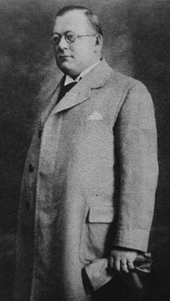Search for Names, Places and Biographies
Already layed Stumbling Stones
Suche
Max Fritsche * 1884
Eißendorfer Straße 193 (Harburg, Harburg)
HIER WOHNTE
MAX FRITSCHE
JG. 1884
IM WIDERSTAND / SPD
VERHAFTET 24.10.1939
ZUCHTHAUS LUCKAU 1940
SACHSENHAUSEN 1942
ERMORDET 15.2.1945
Max Albert Fritsche, born on 26 July 1884 in Magdeburg, transferred from Luckau penitentiary to the Sachsenhausen concentration camp, murdered on 15 Feb. 1945
Eissendorfer Strasse 193 (Harburg District, Eissendorf quarter)
Max Fritsche learned the trade of a lathe operator after finishing the eight-grade elementary school (Volksschule). After completing his apprenticeship, he went on his travels for a while and then signed on as a stoker on a ship of Norddeutsche Lloyd. After a year and a half at sea, he returned to practice his trade.
During this time, he married Auguste, née Laukien, and their first daughter was born in 1906. In the years up to 1918, the couple had three more daughters and two sons. Where the family lived in these first years is not known. The first entry "Fritsche, Max, Dreher [lathe operator], Franckestrasse 16” can be found in 1914 in the Harburg directory.
At the beginning of the First World War in 1914, Max Fritsche volunteered for military service and served in the German Navy until the end of the war. Following the war, he returned to his trade, but there is no information about the companies for which he worked.
He belonged to the German Metalworkers’ Union (Deutscher Metallarbeiterverband – DMV) and was a member of the SPD from 1926. In spring 1933, he joined the "Steel Helmet” ("Stahlhelm”), a nationalist conservative paramilitary organization, but declared his resignation in 1934 when the "Stahlhelm” was incorporated into the SA.
From the end of 1936, Max Fritsche worked at the "Flugmotorenwerk Genshagen,” an aircraft engine plant of Daimler-Benz Motoren GmbH in Ludwigsfelde/Teltow administrative district as a lathe operator and inspector. We do not know whether he left Harburg voluntarily or whether he was enlisted for labor service.
He was arrested by the police in Ludwigsfelde on 24 Oct. 1939 for listening to enemy radio stations, and on 25 Nov. 1939, he was committed to the Lehrter Strasse prison in Berlin for pretrial detention. The indictment dated 14 May 1940 charged him with "deliberately disseminating news from foreign broadcasters which are likely to harm the resisting power of the German people ...; deliberately disseminating untrue allegations of a factual nature which are likely to seriously damage the welfare of the Reich and the reputation of the Reich government.”
Max Fritsche denied the accusations, but seven colleagues at work testified, "he often disparaged the National Socialist government and the measures taken by the state” and "did not allow himself to be influenced by well-intentioned warnings from his comrades.”
The charge was "Crimes and offenses against Sec. 1, 2, 5 of the Ordinance on Extraordinary Broadcasting Measures [Verordnung über ausserordentliche Rundfunkmassnahmen] dated 1 Sept. 1939 – RGBI. [Reich Law Gazette] I P. 1683 . – Sec. 1 of the "Law against Treacherous Attacks on the State and Party and for Protection of Party Uniforms” ["Gesetz gegen heimtückische Angriffe auf Staat und Partei und zum Schutze der Parteiuniformen”] dated 20 Dec. 1934.”
Max Fritsche was convicted by the special court (Sondergericht) at the Berlin Regional Court (Landgericht) and imprisoned in the Luckau penitentiary. In Feb. 1942, he was transferred to the Sachsenhausen concentration camp for "political training,” as the documents say.
He died on 15 Feb. 1945. The death certificate states that the cause of death was a stroke. According to several fellow prisoners, he was "gassed together with many others.”
Translator: Erwin Fink
Kindly supported by the Hermann Reemtsma Stiftung, Hamburg.
Stand: June 2020
© Margrit und Helmut Rüth
Quellen: StaH 351-11_7476; StaH 351-11_8298; Adressbuch Harburg 1914 | 1938; Matthias Heyl und Margit Maronde-Heyl: Harburger Opfer des Nationalsozialismus.


